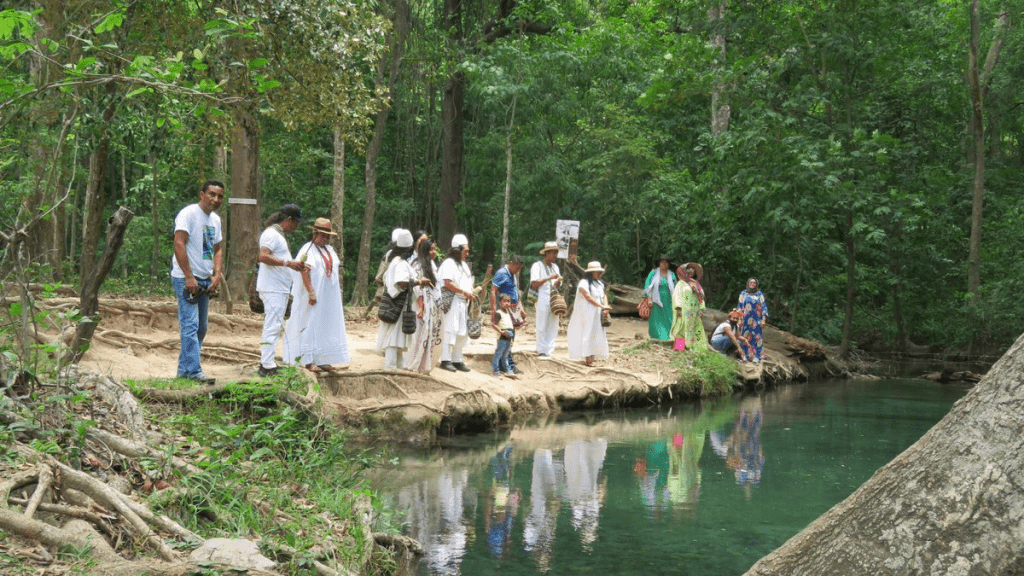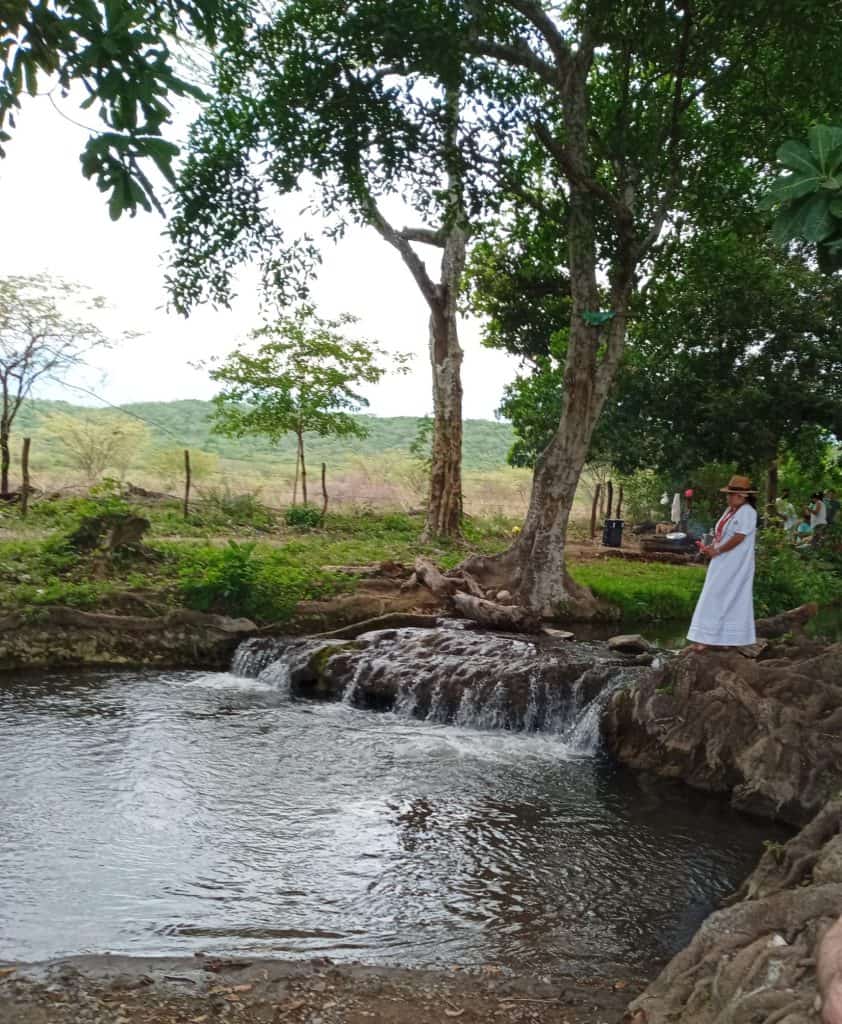The village of Cañaverales is in the municipality of San Juan del Cesar in the south of the department of Cesar. It is a community of Afro-Colombians, numbering some 1,800, who live from agriculture and who have a rich cultural heritage. It is represented by the Afro-Colombian Community Council of Cañaverales (Consejo Comunitario de Negros de Cañaverales). This community live in an area where the ecosystem is fragile. The community benefit from a spring, a river and several irrigation ditches that supply water to the village itself as well as to 15 others, and which irrigate 5,000 hectares of farmland.

The watercourses, including the River Cañaverales, sacred to the people in the region, and the source of drinking water which, due to its purity, can be consumed untreated. According to Council, MPX Colombia, the Brazilian-owned mining company that had originally been seeking to exploit the area, had published an epidemiological report claiming that the water was responsible for gastric and other diseases. The community asked the local health authorities to test the water, and they confirmed that it was free from contamination. For the community, the report by MPX was “…just one more in a series of lies which have been disseminated by the mining companies”.

The latest threat to Cañaverales comes from the Best Coal Company (BCC), a subsidiary of the Turkish company Yilmaden, which bought the land titles off MPX Colombia in 2016. BCC plans to extract thermal coal (coal for electricity generation that is exported) through open-cast mining only 800 metres from the community. BCC claims that its operations would not affect the village. However, the community of Cañaverales has grave concerns about its potential socio-environmental impact, having as a direct example the experience of the communities surrounding El Cerrejón.
The community is particularly concerned that BBC’s mining activities would be only 1.2 km from the underground cavern which is the source of the natural spring feeding the Cañaverales river. The area above the cavern, which extends over 3 hectares has been designated a Protected Forest Area by Corproguajira (La Guajira’s environmental authorities). The community fears that explosions from the mine could cause the cavern’s roof to collapse, with devastating consequences for the region’s water supply.
BCC is already buying up land traditionally used for agricultural production. The community estimates that, including the effect on water sources, the total land area affected by the mine would reach 79,000 hectares, bringing with it displacement of the community and threatening the ecosystems of 113 species.
BCC claims that the Cañaverales operations would be small-scale, but this is to be part of a much more expansive project as BCC plans, “two open-cast mines [including Cañaverales ]and one underground mine, along with the construction of a 150 km railway line connecting the mining complex with a port in the municipality of Dibulla, through which 35 million tonnes of coal would be exported annually.”
Despite the potential impacts of the mine, both on the community of Cañaverales and on neighbouring villages, there have been serious failings in the consultation process. Initially, the Ministry of the Interior did not even recognise Cañaverales’ right to prior consultation, forcing the community to obtain a court ruling, in 2019, establishing its ethnic status.
In spite of the ruling, there has been a systematic failure on the part of the authorities and BCC to provide information to the community on the potential impacts of the mine, such as the preliminary studies of the project, even though they are available. The community wished to have the information analysed by independent experts in geology, hydrology and engineering before the consultation meetings took place, in line with the principle that the consultation should be free, prior and informed.
BCC and the Ministry of the Interior failed to provide any written information prior to the first pre-consultation meeting on 20 October 2021, nor at the meeting itself, making any meaningful discussion impossible. At the time of the delegation’s visit six months later, the company had provided only about 10% of the information requested – on a hard disc, when Cañaverales has no computers (nor internet). Despite this, BCC has repeatedly refused requests for information in paper form so that it can be disseminated widely within the community.
Although the community has repeatedly stressed its willingness to participate in prior consultation, its insistence on full information has led to accusations that it is being obstructive, with Ministry of the Interior officials threatening to report them to the legal authorities for not wanting to participate and for asking for the presence of Defensoría del Pueblo (National Ombudsman) and Procuraduría General (Inspector General’s Office) at consultation meetings.[1] As well as these threats, the Ministry of the Interior and BCC’s communications have been disrespectful to the community, accusing it of ignorance in relation to its rights.
Cañaverales is the only community of nine affected by the BCC mine where the consultation process is still ongoing. In the other eight cases, these processes were completed by 2020. Organisations supporting Cañaverales have expressed alarm at the speed at which these processes were conducted. The stages of analysis and identification of impacts and formulation of management measures were completed in just one day, impossible for a true evaluation of the social, environmental, spiritual, cultural and human rights impacts of a mining megaproject.
Conclusions
- The moves to speed up meetings so that consultation is reduced to an ‘express’ mechanism, restricts the right to self-determination of peoples and becomes a form of coercion.
- Restrictions on prior access to information breach national and international standards on prior consultation of ethnic peoples regarding mining, the rights to democracy and environmental justice, as well as the obligations of companies to respect human rights.
- Cañaverales’ agricultural production, fed by the Cañaverales spring and river water, is fundamental to the region’s food security and sovereignty in a territory with a rich culture.
It is vital that, going forward, national and international standards are upheld in the consultation process with the community of Cañaverales.
